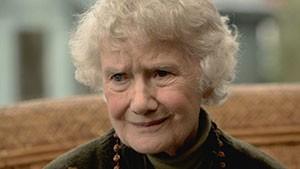


Watch the film clips of Ellen's story below and consider the questions at the bottom of the page.
 Ellen is 81 and is living with dementia at home. Her daughter Caroline lives nearby and is her main source of support, although she also uses formal care at home and day care support. When visiting early this morning, before work, Caroline found Ellen in her bathroom appearing very distressed. Ellen had fallen over during the night when she got up to use the bathroom. Caroline phoned for an ambulance and Ellen was admitted to hospital. Upon examination, Ellen was found to be dehydrated and confused, with low grade pyrexia.
Ellen is 81 and is living with dementia at home. Her daughter Caroline lives nearby and is her main source of support, although she also uses formal care at home and day care support. When visiting early this morning, before work, Caroline found Ellen in her bathroom appearing very distressed. Ellen had fallen over during the night when she got up to use the bathroom. Caroline phoned for an ambulance and Ellen was admitted to hospital. Upon examination, Ellen was found to be dehydrated and confused, with low grade pyrexia.You have printed a page containing audio/video content. We can't print that, so we've provided a transcript for you instead.
[Ellen is looking concerned and frowning in the direction of the corner of the room. She becomes distressed and starts shouting and pointing.]
Ellen - That's my dressing gown! Why has she got my dressing gown?! Give it back! Now!
[Ellen tries to climb out of bed but a nurse arrives to settle Ellen.]
Ellen - What sort of a place is this? What is she like?
Nurse one - Ellen...
Ellen - The thief! Someone's got to help me!
Nurse one - You've got to stay in bed or you're going to pull that out [points at monitor system].
[The nurse helps Ellen settle back in bed. Ellen is still upset.]
Nurse one - Nobody's got your dressing gown. There IS no dressing gown.
[Nurse two enters and approaches the bed.]
Nurse two - Ellen you need to stay in bed or you'll pull this out.
[Ellen looks down at her drip and tries to pull at it.]
Ellen - Who put that there? That's not mine!
Nurse one - [to nurse two] we are going to have to get the doctor to get something to get her settled.
[Ellen is looking concerned and frowning in the direction of the corner of the room. She becomes distressed and starts shouting and pointing.]
Ellen - that's my dressing gown! Why has she got my dressing gown?! Give it back! Now!
[Ellen tries to climb out of bed but two nurses appear to settle Ellen.]
Ellen - What sort of a place is this? What is she like?
Nurse one - Ellen...
Ellen - The thief! Someone's got to help me!
Nurse one - It's ok; we'll get this sorted for you. Come on, into bed.
Nurse two - I think this may be the problem. [She points to the corner of the room and approaches it.]
Nurse one - [to Ellen] I think it's a bit dark in here and difficult to see. We'll get the light switched on.
Nurse two - is in the background moving the drip stand. This is what Ellen has been confusing with a woman and her dressing down.
[Nurse two switches on the lights.]
Nurse one - Ah! Ellen. Is that better? Can you see? There is no dressing gown.
[Ellen still looks confused.]
Ellen - But it's my dressing gown. Where is it?
Nurse two - Ellen, I'll get your dressing gown. It's just down here.
Nurse two - Looks in bedside cabinet for dressing gown.
Ellen - Why am I upstairs? I never sleep upstairs.
Nurse one - Ellen it's ok. You're in the hospital. Caroline's just gone for a bite to eat. She'll be back in a few minutes.
[Ellen appears to have settled now.]
Ellen - She needs a rest. She never stops.